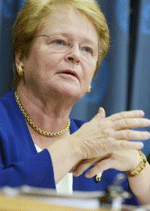“The Future We Want” without sexual and reproductive rights
Published on Thu, 2012-06-28 08:56
Women rights organizations expressed deep disappointment and outrage over “The Future We Want”, the outcome document approved by the United Nations Conference on Sustainable Development (Rio2012) held last week in Brazil, reported Inter Press Service news agency (IPS). “The omission of reproductive rights” is “a step backwards from previous agreements,” said former prime minister of Norway Gro Harlem Brundtland. According to IPS United Nations Bureau Chief Thalif Deen, the comparison with the 1992 Agenda 21 was inevitable. Anita Nayar of the Manila-based Development Alternatives with Women for a New Era (DAWN) told that in the historic agreement adopted in 1992, there were around 170 references to gender and an entire chapter on women. But in “The Future We Want” there are only around 50, and these have been watered down and were used as negotiating chips by states, Nayar said, interviewed by Deen in Rio de Janeiro. “It is not a simple matter of gender mentions either, but rather there is clearly unwillingness by some states to agree on concrete actions and an overall weakening of internationally agreed commitments on gender equality and women’s empowerment,” the activist added. She said while human rights are generally affirmed in the context of sexual and reproductive health, the specific omission of reproductive rights is glaring. Equally critical was Gro Harlem Brundtland, a former prime minister of Norway and chair of the Brundtland Commission which brought the concept of sustainable development to global attention 25 years ago. “The Rio2012 declaration does not do enough to set humanity on a sustainable path, decades after it was agreed that this is essential for both people and the planet. I understand the frustration in Rio today,” she said in a statement released last week. “We can no longer assume that our collective actions will not trigger tipping points, as environmental thresholds are breached, risking irreversible damage to both ecosystems and human communities. These are the facts – but they have been lost in the final document,” Brundtland added. “Also regrettable is the omission of reproductive rights – which is a step backwards from previous agreements. However – with this imperfect text, we have to move forward. There is no alternative,” she said. The reactions from groups at the grassroots level were mostly negative. “I haven’t seen this much fake green covering since last St Patrick’s day. The document does not come close to the future we really want and that’s because it was written with the interests of the few rather than the many in mind,” said Nathan Thanki of Earth, one of the protesting youth leaders who occupied the plenary entrance at the Rio2012 site on Thursday 21. Nicole Bidegain of GEO-ICAE, Uruguay said, “The green economy simply reinforces the current model of development, based on overconsumption and production. The same financial mechanisms that caused multiple crises since 2008 are being promoted, but this time to commodify nature. There is enough evidence on the negative impacts of the financialisation of nature on women’s rights and livelihoods. “ Monica Novillo, of Coordinadora de la Mujer, Bolivia, said, “I came to Rio2012 with high expectations that governments would build on the landmark resolution on sexual and reproductive health and rights for youth and adolescents adopted at the 45th Commission on Population Development.” She said Brazil played a key role in creating this outcome, “so I expected that they would strongly defend these fundamental rights at Rio2012 against a minority of conservative governments.” While the Cairo and Beijing agendas (on population and women) were reaffirmed at Rio2012, it is high time that these agreements are fully implemented, she added. Gita Sen of DAWN regretted that Rio2012 had virtually buried reproductive rights. “Reproductive rights have been traded away. It is very clear in this outcome document that there is a continuing war on women’s human rights launched by the Holy See (Vatican) along with some very conservative governments,” Sen told IPS Source
|
SUSCRIBE TO OUR NEWSLETTER



